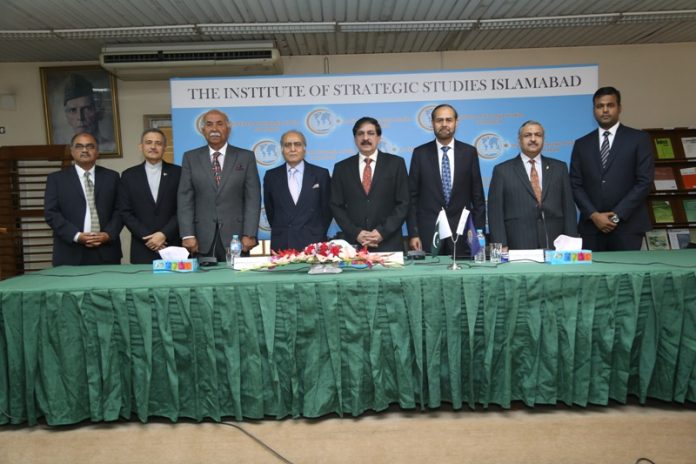PRESS RELEASE
One-day National Conference
on
Maritime Economy and the Geopolitics of Indian Ocean Rim: Challenges for Pakistan
February 22, 2018
“Nothing is in isolation. The Indian Ocean and the power politics that it holds within its folds is perhaps not fully understood.” This was stated by Lt. Gen. (R) Nasser Khan Janjua, National Security Advisor of Pakistan, during his address as Chief Guest, at a One-day National Conference on, “Maritime Economy and the Geopolitics of Indian Ocean Rim (IOR): Challenges for Pakistan”, organized by the Institute of Strategic Studies Islamabad (ISSI) in collaboration with Bahria University Islamabad.
The speakers at the Conference included: Dr. Azhar Ahmad, HOD, Department of Humanities and Social Sciences Bahria University, Islamabad; Commodore Zafar Mansoor Tipu, Former Director National Centre for Maritime Policy Research Centre Bahria University; Commodore Babar Bilal, Director National Centre for Maritime Policy Research Islamabad; Mr. Waqar Ahmed, Sr. Joint Secretary Ministry of Maritime Affairs; Mr. Ahmer Bilal Soofi, President Research Society of International Law; Dr. Idrees Khawaja, HOD, Air University School of Management Islamabad and Dr. Safdar Sohail, Director General National Institute of Management and Member Governance Planning Commission and Mr. Abbas Hassan, Research Associate, Institute of Strategic Studies Islamabad.
Lt. Gen. (R) Nasser Khan Janjua outlined how Asia has the world’s largest human resources, consumer markets, natural markets, development scope, and connectivity potential. In order to connect this with the rest of the world, the major channel present is the Indian Ocean, which is known for being a strategic conduit of commerce, and provides the foundation for trading systems that underpins Asia’s economic importance. He said that great power rivalries are being aggravated in Asia: China and Russia are being taken as challengers, the region has become more competitive than cooperative; and there is a perpetual war in Afghanistan, which has no end in sight. In order for Pakistan to multiply its potential, it has to re-alter the region and become a massive trade corridor. For that it should recognize that the common future lies with Iran, Afghanistan, Central Asian Republics, China and sometimes with Russia. Furthermore, both India and Pakistan should engage, resolve their disputes and look towards the future.
In his remarks at the Inaugural Session, Rear Admiral (Retd) Mukhtar Khan HI (M), Director General Institute of Maritime Affairs at Bahria University said that the maritime economy model has established a sustainable development framework for developing countries and effective leadership can help channel this model to the forefront. In order to promote a more integrated effort, the Government should make a strategic decision to take the ‘blue economy’ approach. This will pave the way for a comprehensive study of this sector and how to harness its full potential.
The main points raised during the conference were that tapping into the full potential of maritime sector has not been given its due attention by Pakistan, and that ‘blue economy’ needs to be given special attention for the ultimate sustainable use of Pakistan’s maritime resources for economic growth, improved livelihoods and jobs, as well as the ocean’s ecosystem health. It was pointed out by the speakers that the current security environment in the Indian Ocean region is characterized by unique features: the sub regional regimes are weak, existing security arrangements are primarily lead by the West and there is an emphasis on bilateral rather than multilateral security arrangements. After internal stability, Pakistan’s primary challenge is lack of maritime outlook. By exploiting its maritime potential to the fullest, Pakistan can extricate itself from its present state of inadequate economic resource mobilization and launch itself on an alternative trajectory leading to rapid economic growth and social development. There is a need to develop maritime clusters connected with national and international economy, enhance the ‘absorbing capacity’ in the long run and create a concentration of capable officers from different sources. Policy makers in Pakistan need to come up with a reform plan in order to develop a strategic plan for blue economy, establish a scientific task force to measure the natural capital and the value of eco-system services and, in the context of China-Pakistan Economic Corridor, establish a joint Pakistan-China scientific group to publish a joint Pak-China blue economy report. Moreover, in order to give the private sector incentive to invest, a legal cover needs to be provided. All the speakers agreed that changing mindsets is never easy, but the transition has already begun particularly after CPEC, and all it needs is to be given direction and momentum.
Earlier, in his opening remarks, Chairman ISSI, Ambassador Khalid Mahmood spoke about the importance of understanding maritime economy. He said that the Indian Ocean is the key transit region for inter-continental trade and Pakistan would do well to exploit this to its full potential. He said that Gwadar is not going to be an ordinary port, it will be the lynchpin of CPEC’s multi-billion strategic investment because of its location, and that it will survive the challenges of modern shipping. If we are aspiring to be a rising Asian power in the decades ahead, we will have to pay more attention to developing our maritime sector. Ambassador Mahmood in his concluding remarks stated that Pakistan is not fully utilizing the benefits that are accrued to it under the law of the sea. The role of private sector should be encouraged. He said that there is lack of maritime awareness and this needs to be rectified and develop a maritime culture.












